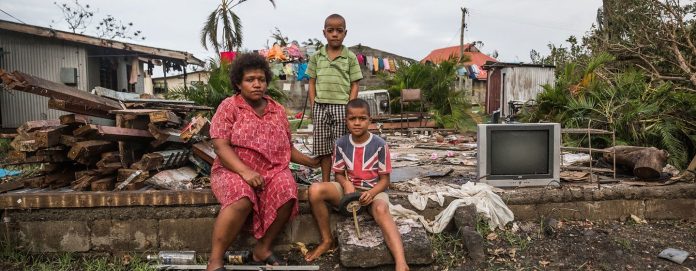-A group of least developed countries and small island states have joined forced with researchers to better support communities recover from climate damages.
Nepal, Bangladesh, Senegal, Malawi, Jamaica, Trinidad and Tobago, Tonga and Vanuatu are exploring setting up national facilities to channel resources for climate disasters response and disburse money where it is most needed.
The initiative will help communities inform governments on how to respond to future climate shocks from a local perspective.
The alliance is being supported by the International Centre for Climate Change and Development (ICCCAD) in Bangladesh, and the International Institute for Environment and Development (IIED) in the UK.
Ritu Bharadwaj, a researcher at IIED, said the bottom-up approach would avoid “pre-conceived solutions” and ensure countries are “ready to deploy any additional funds which might be available in the future”.
In a breakthrough deal at the Cop27 climate talks in Egypt, countries agreed to set up a fund dedicated to support vulnerable countries address climate-related losses and damages.
But it could be a long time before money is mobilised. A transitional committee is due to work out how the fund would operate, who will pay, who will benefit and how it will be governed and make recommendations ahead of the next round of UN climate talks in the UAE.
The 24-people committee is due to hold its first meeting in Luxor, Egypt, on the 27-29 March despite the Asia Pacific group’s failure to nominate their two representatives. Several sources told Climate Home News this was because of several countries competing for the positions.
Mohamed Nasr, Egypt’s lead climate negotiator and one of the committee members, said: “This issue is of extreme importance to everybody, so everybody wants to be sitting at the table.”
Two sources told Climate Home that nominations from the group are expected soon.
The alliance will help vulnerable countries prepare for the handling of loss and damage funds, said Saleemul Huq, director of the ICCAD.
“Money is not going to come for a while so part of the exercise is to know how to use it when it comes,” Huq told Climate Home. “So this is a knowledge-first approach.”
Huq said the alliance will support the development of locally-led solutions, co-created with communities, which are cost-effective.
“It’s about getting a better handle on what is needed to respond to unavoidable climate impacts so countries are ready to address them when they come. People can’t afford to wait until the world wakes up and starts filling the coffers of the loss and damage fund,” he said.
To make the most of the patchwork of existing but limited funds, the alliance urged countries to create a national facility that pools funding from the private sector, development aid, philanthropies, insurance, debt relief mechanisms, national budgets and new funding opportunities under the G7-backed Global Shield.
These national entities can act as a ready vehicles to disburse any future loss and damage cash in a cost-effective, accountable and transparent way, researchers say.
Christopher Bartlett, a member of Vanuatu’s national advisory board on climate change and disaster, said the nation was “one of the strongest allies” of the initiative.
Vanuatu is reeling from the devastation caused by two cyclones which hit the small-island state within 24 hours of each other last week.
Lubna Yasmine, joint secretary on climate change at Bangladesh’s environment ministry, described the approach as “very good”.
“It’s very important to put people at the center of the action because if we can help communities directly, they can solve their own problems and come up with innovative solutions,” she said. “There is no time for delayed action, we need to get to work immediately.”.
SOURCE: CLIMATE HOME/PACNEWS













